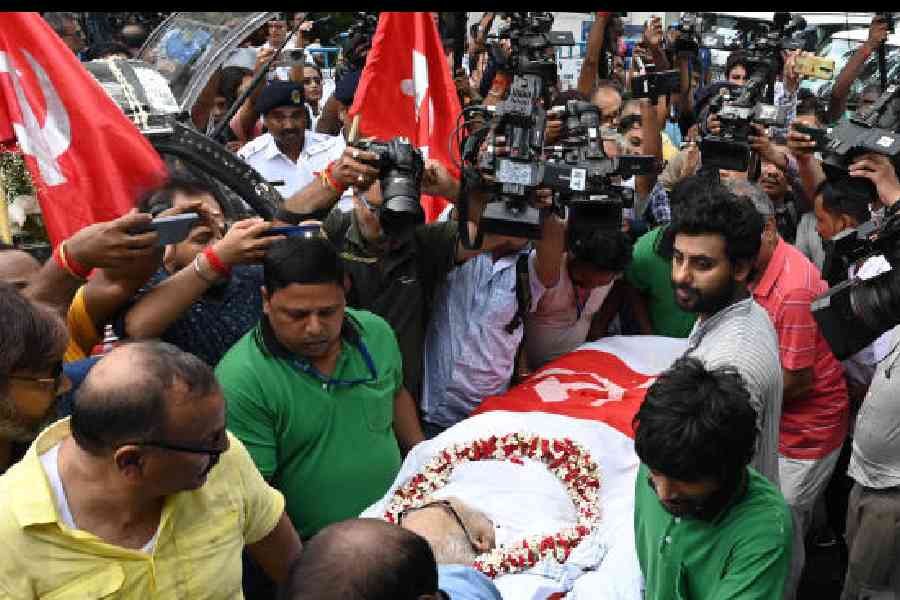Buddhadeb Bhattacharjee is no more, but his dream for Singur is still alive.
A large section of Singur farmers, including those who once saw Buddhadeb Bhattacharjee as an offender for acquiring their fertile land to set up Tata Motors’ small car factory, now agrees that industry is the only viable option for around 700 acres of land where cultivation is no longer possible.
Mangaldip Mandal, a 22-year-old B.Tech student at a private college in Hooghly, whose family’s three acres of farmland were part of Tata’s approximately 1,000-acre small car factory, still, dreams of industry coming up on their land.
“I was a child when Tata left, and I heard the entire story from my mother. I don’t think the dream of our former chief minister died with him. I studied technology hoping that one day some industry would come up in our area,” said the young student.
Although Tata began manufacturing its cars at the Singur factory, it had to abandon the project amid continuous protests led by then-opposition leader Mamata Banerjee. The Singur movement is considered one of the major factors that led to her ascent to power in Bengal in 2011.
In 2016, the Supreme Court quashed the state government’s acquisition of 997 acres of agricultural land for the Tata project.
After the ruling, the ruling Trinamul Congress began the process of returning land to around 9,000 landowners.
However, despite the state converting 300 acres of land for cultivation, 700 acres remain barren due to the construction and modifications by Tata Motors.
Mandaldip’s elder brother, Viki, is also a tech graduate and works at a private factory in Chennai, as he could not find a job with a suitable salary in Bengal.
“If Tata had continued its factory, my elder son wouldn’t have had to move far away for work. With our former chief minister’s passing, we feel as if we’ve lost a family member,” said Dipali Mandal, Mandaldip’s mother.
Dipali mentioned that as a member of a land-loser family, she received a job at Tata’s factory and underwent training with a stipend of ₹4,000 a month.
Like her hundreds of others trained by Tata Motors and selected for jobs at the Singur factory now compromise their careers by opening small shops or working as contractual workers.
“I was trained in fitting car accessories at Tata’s training institute in Pune and was selected for a job. If they hadn’t left Singur, my salary would be at least ₹50,000 a month. Now, I earn ₹8,500 by working as a civic volunteer,” said one person, who wished to remain anonymous.
When Mamata Banerjee and her TMC started protesting against setting up factories on three-crop fertile land, the farmers were divided into two groups: willing and unwilling. While the willing farmers sided with the Buddhadeb Bhattacharjee government, the unwilling faction continued their protests until Tata announced its decision to withdraw.
Now, a large section of those previously unwilling farmers demand industry in Singur, particularly on the stretch of land that remains barren.
“We protested to save our fertile land. Now, we know the government can’t do anything with the 700 acres of land due to the concrete structures. So, we demand the current state government set up industry on that stretch,” said Doodh Kumar Mondal, a former leader of the Singur Krishi Jami Raksha Committee, the face of the anti-Tata movement.
“Today, Buddhababu passed away, and the best tribute to him would be setting up industry on the barren Singur land,” he added.
A source mentioned that the majority of the farmers whose land was part of the factory are contemplating organising a movement soon to demand industry on the barren stretch.
“We will have two demands. First, the state government must transform the barren land into agricultural fields where possible. Second, industries must be set up on the remaining stretch,” said a farmer who once led the movement.
“Snakes now run through the concrete roads where Tata Nano was supposed to drive. We still dream that one-day industry will come up there, whether it be automobiles or something else,” said Pravat Banerjee, a local CPM leader in Singur.










